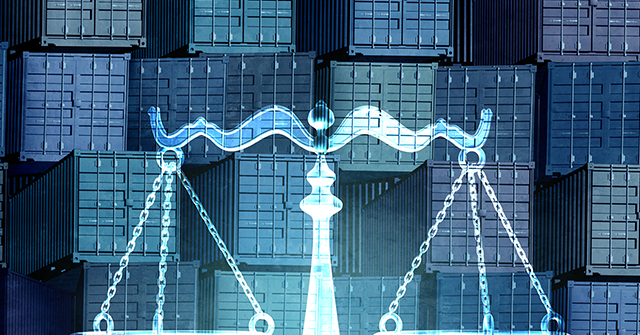Tariffs Are Trade Regulation
A federal judge in Washington recently ruled that the president cannot impose tariffs under the International Emergency Economic Powers Act (IEEPA). The decision, handed down in Learning Resources v. Trump, claims that while IEEPA lets the president “regulate importation,” it doesn’t go far enough because it doesn’t use specific words like “tariffs,” “duties,” or “taxes.” Unless Congress spells it out, the court held, the president may block or prohibit imports, but not charge a fee on them.
That distinction is now under serious challenge from a well-placed source: Chad Squitieri, a professor at Catholic University and a former clerk for Justice Neil Gorsuch, writing in the latest issue of the Harvard Journal of Law & Public Policy. The journal, long associated with the Federalist Society, has become something of a staging ground for legal arguments that later find their way into Supreme Court opinions. Squitieri’s piece is not aimed at headlines—it’s aimed at justices.
IEEPA’s phrase “regulate importation” should, by any reasonable reading, include tariffs. It’s not an obscure inference. For more than 200 years, American lawmakers have used tariffs both to raise revenue and to shape trade policy. At the founding, Congress imposed duties not just to fund the government but to encourage domestic manufacturing. James Madison defended that approach, and Chief Justice Marshall acknowledged it in Gibbons v. Ogden. Joseph Story called duties a “common means” of regulating commerce.
The power to tax and the power to regulate are distinct, but the tools can overlap. Tariffs, Squitieri explains, don’t belong exclusively to the taxation side of the ledger. They’ve long served both purposes. The Constitution permits that overlap, and Congress has always legislated with it in mind. That means a statute authorizing the president to regulate imports doesn’t need to separately recite “tariffs” to include them.
The real issue, then, isn’t whether tariffs require magic words. It’s whether the courts will recognize that traditional tools—used across administrations and eras—remain available under modern delegations of power.
The President Has More Leeway in Foreign Affairs
That’s especially important in foreign affairs. Courts have long treated the president’s international powers as broader than his domestic ones. The landmark Curtiss-Wright decision affirmed that Congress can grant greater discretion in matters of diplomacy, trade, and national security because the president already acts as the nation’s voice abroad. More recently, even Justice Gorsuch—perhaps the leading voice for stricter limits on delegation—has said that foreign affairs are different. They operate within a zone of executive power that already belongs, in part, to the White House.
IEEPA fits that mold. It doesn’t give the president a blank check. It limits his power to declared emergencies and actions tied to foreign interests. It includes carveouts—for personal communications, for informational materials, for humanitarian donations. It requires the president to act by regulation, instruction, or license. That’s enough structure to satisfy the courts’ “intelligible principle” test for delegation. The statute gives guidance. It names targets. It describes methods. It imposes boundaries. And under decades of precedent, that’s more than sufficient.
What about the major questions doctrine? Squitieri deals with that too. If the doctrine means Congress must speak clearly when delegating significant power, then IEEPA’s authorization to “regulate importation” does the job—especially in a context where tariffs have always been a standard instrument. And if the doctrine is really about preventing surprise grants of authority, the argument falls apart on history. Presidents have regulated trade through tariffs for more than two centuries, often under statutes less explicit than IEEPA. When Nixon imposed an import surcharge during the 1971 monetary crisis, the courts upheld it under the same basic statutory language. It’s not a new claim of power. It’s a continuation of settled practice.
That’s what makes this debate more than legal housekeeping. If courts adopt the district court’s view, the president would lose access to one of the few swift and scalable tools available during global economic shocks. Tariffs are not only about raising prices—they’re about setting terms. They allow the U.S. to respond to predatory trade, sanction hostile actors, or rebalance dependencies. Without them, emergency economic powers begin to look like a travel ban and a strongly worded letter.
The market implications are clear. If this decision stands, tariff risk in emergencies drops—at the cost of flexibility and deterrence. If Squitieri’s view prevails, the White House retains the ability to shape global trade flows with speed and force. Investors, exporters, and foreign governments should take note: the legal case for Trump’s use of tariffs under IEEPA isn’t some novelty. It’s an originalist argument grounded in history, precedent, and the plain structure of constitutional power.
Read the full article here
